Serving 479 students in grades Prekindergarten-6, Libertas School ranks in the bottom 50% of all schools in Tennessee for overall test scores (math proficiency is bottom 50%, and reading proficiency is bottom 50%).
The percentage of students achieving proficiency in math is 15-19% (which is lower than the Tennessee state average of 31%). The percentage of students achieving proficiency in reading/language arts is 20-24% (which is lower than the Tennessee state average of 37%).
The student:teacher ratio of 25:1 is higher than the Tennessee state level of 15:1.
Minority enrollment is 86% of the student body (majority Black), which is higher than the Tennessee state average of 43% (majority Black).
Quick Stats (2025)
- Grades: Prekindergarten-6
- Enrollment: 479 students
- Student:Teacher Ratio: 25:1
- Minority Enrollment: 86%
- Overall Testing Rank: Bottom 50% in TN
- Math Proficiency: 15-19% (Btm 50%)
- Reading Proficiency: 20-24% (Btm 50%)
- Science Proficiency: 15-19% (Btm 50%)
- Source: National Center for Education Statistics (NCES), TN Dept. of Education
School Overview
Libertas School's student population of 479 students has grown by 25% over five school years.
The teacher population of 19 teachers has grown by 11% over five school years.
Grades Offered
Grades Prekindergarten-6
Total Students
479 students
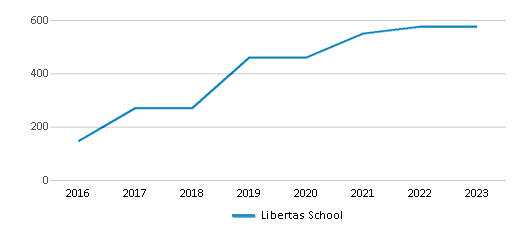
Gender %
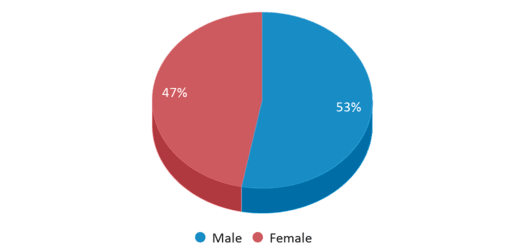
Total Classroom Teachers
19 teachers
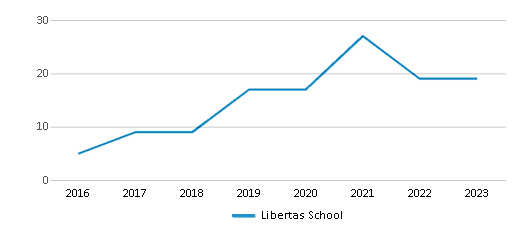
Students by Grade
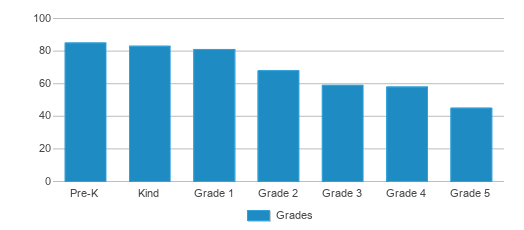
School Rankings
Libertas School ranks within the bottom 50% of all 1,761 schools in Tennessee (based off of combined math and reading proficiency testing data).
The diversity score of Libertas School is 0.34, which is less than the diversity score at state average of 0.61. The school's diversity has stayed relatively flat over five school years.
Overall Testing Rank
#1315 out of 1761 schools
(Bottom 50%)
(Bottom 50%)
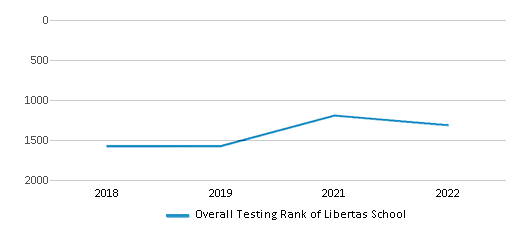
Math Test Scores (% Proficient)
15-19%
31%
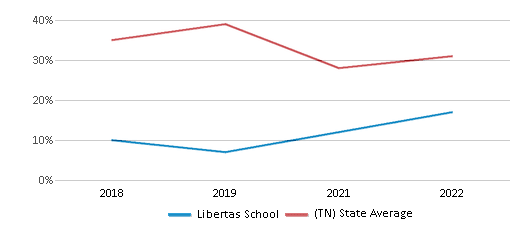
Reading/Language Arts Test Scores (% Proficient)
20-24%
37%
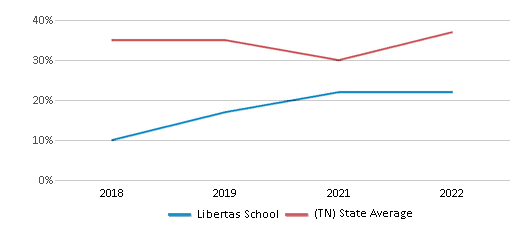
Science Test Scores (% Proficient)
15-19%
40%
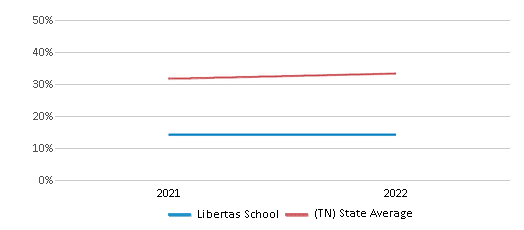
Student : Teacher Ratio
25:1
15:1
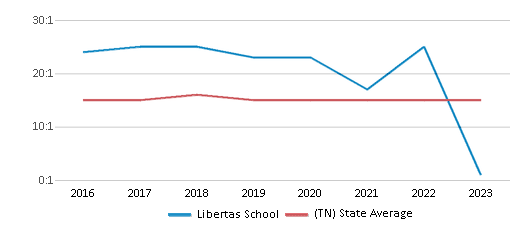
American Indian
1%
n/a
Asian
1%
2%
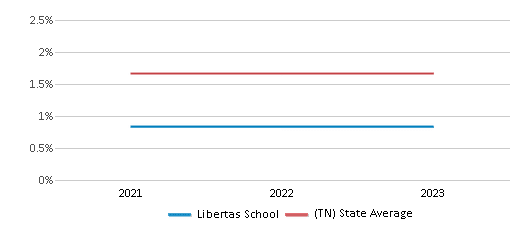
Hispanic
3%
15%
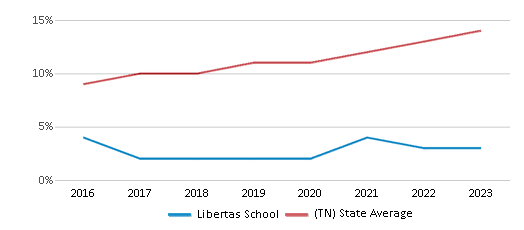
Black
80%
21%
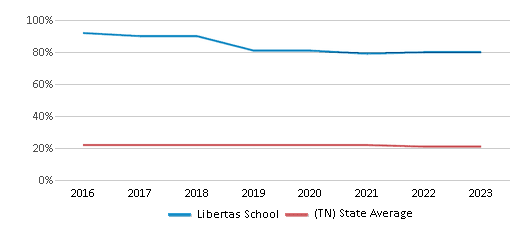
White
14%
57%
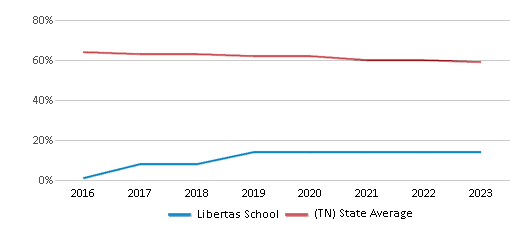
Hawaiian
1%
n/a
Two or more races
n/a
5%
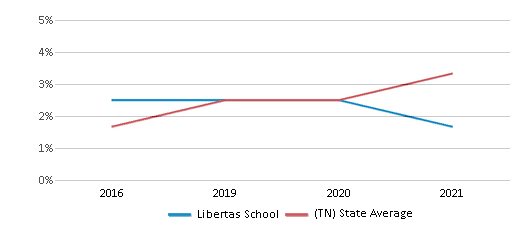
All Ethnic Groups
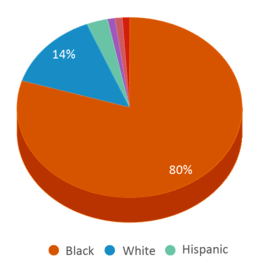
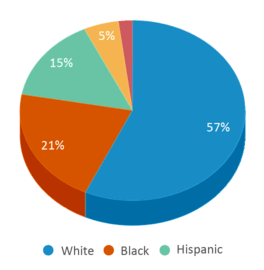
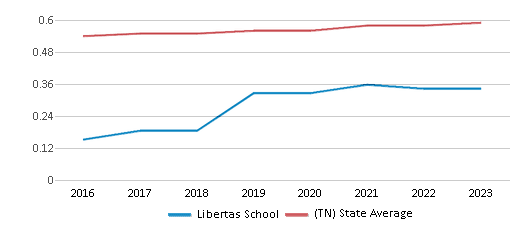
Participates in the National School Lunch Program (NSLP)
Yes
School Statewide Testing
School District Name
Extracurriculars
Total ExtracurricularsTotal Extra-curric.
1 extracurricular
ExtracurricularsExtra-curric.
Club or Organization:
LEAPS after care
LEAPS after care
Source: National Center for Education Statistics (NCES), TN Dept. of Education
Profile last updated: 02/09/2025
Frequently Asked Questions
What is Libertas School's ranking?
Libertas School is ranked #1315 out of 1,761 schools, which ranks it among the bottom 50% of public schools in Tennessee.
What percent of students have achieved state testing proficiency in math and reading?
15-19% of students have achieved math proficiency (compared to the 31% TN state average), while 20-24% of students have achieved reading proficiency (compared to the 37% TN state average).
How many students attend Libertas School?
479 students attend Libertas School.
What is the racial composition of the student body?
80% of Libertas School students are Black, 14% of students are White, 3% of students are Hispanic, 1% of students are American Indian, 1% of students are Asian, and 1% of students are Hawaiian.
What is the student:teacher ratio of Libertas School?
Libertas School has a student ration of 25:1, which is higher than the Tennessee state average of 15:1.
What grades does Libertas School offer ?
Libertas School offers enrollment in grades Prekindergarten-6
What school district is Libertas School part of?
Libertas School is part of Achievement School District.
In what neighborhood is Libertas School located?
Libertas School is located in the Frayser neighborhood of Memphis, TN. There are 21 other public schools located in Frayser.
School Reviews
5 2/17/2020
To find a school that holds all the characteristics I desired in my daughter's first school is absolutely amazing. The environment is so inviting. From the informative texts, the personal calls and the overall teaching style are just awesome. She is learning life skills as well as academics. Libertas is the best.
5 2/10/2020
Join the Libertas team! Administration is genuinely committed to the development of its staff and works hard to support them in many ways.
5 2/10/2020
Libertas has been the best decision for my sons. It's not just a school it's a village of engaged professionals who care about educating our children. My boys are both autistic and I can truly say they are flourishing academically and socially and this is their first year attending. I am looking forward to more successful years ahead.
5 2/10/2020
Libertas is definitely working for my 4year old in the pre-k program. The lessons that are taught I appreciate her knowing are cleaning, preparing breakfast and folding clothes. She cannot wait to get home to help around the house. Those opportunities increase their independence, self belief, confidence and esteem. It's not a so called traditional style of learning. They are free to move around the room instead of staying at a desk.
Review Libertas School. Reviews should be a few sentences in length. Please include any comments on:
- Quality of academic programs, teachers, and facilities
- Availability of music, art, sports and other extracurricular activities
Recent Articles

What Is A Charter School?
Explore the world of charter schools in this comprehensive guide. Learn about their history, how they operate, and the pros and cons of this educational innovation. Discover key facts about charter schools, including admission policies, demographics, and funding, as well as what to look for when considering a charter school for your child.

10 Reasons Why High School Sports Benefit Students
Discover the 10 compelling reasons why high school sports are beneficial for students. This comprehensive article explores how athletics enhance academic performance, foster personal growth, and develop crucial life skills. From improved fitness and time management to leadership development and community representation, learn why participating in high school sports can be a game-changer for students' overall success and well-being.

February 05, 2025
Understanding the U.S. Department of Education: Structure, Impact, and EvolutionWe explore how the Department of Education shapes American education, from its cabinet-level leadership to its impact on millions of students, written for general audiences seeking clarity on this vital institution.













